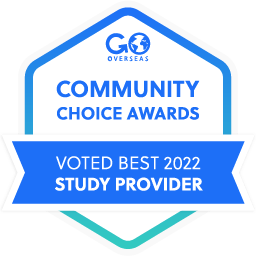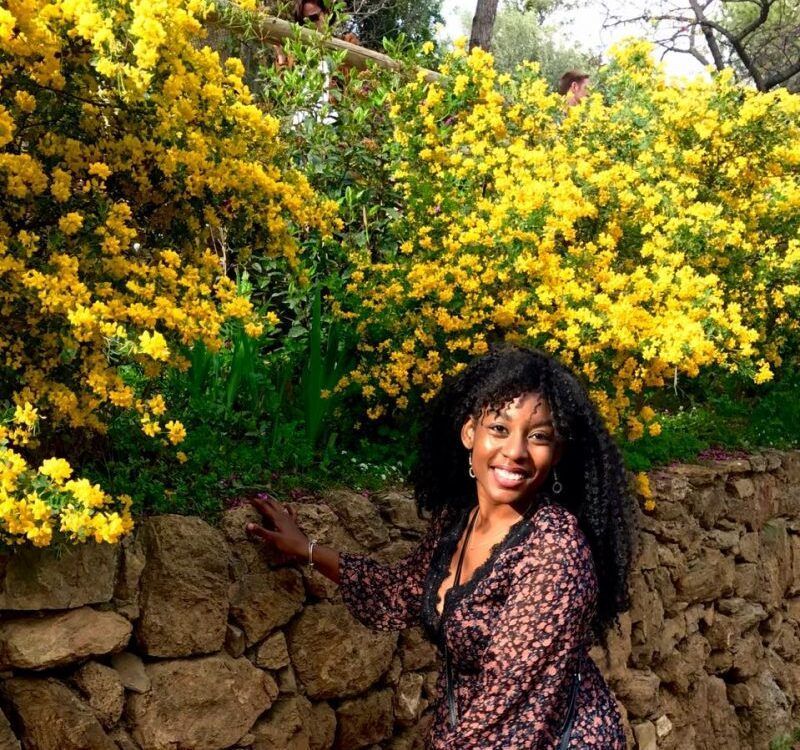
‘A Better Understanding’ – Running an English Class for Refugees in Athens – An Interview with Lizzy Giovanniello and Kelsey Serraneau
Cover Photo: Spring ’18 Student, Kelsey Serraneau.
Starting their studies in Athens, two Spring Semester students, Kelsey and Lizzy, knew they wanted to engage with their surroundings through volunteering. CYA’s director for student affairs, Nadia Melinioti, connected Lizzy and Kelsey with Welcommon, a model community center for hosting and promoting social inclusion for refugees. The project is funded by EU through the United Nations High Commission for Refugees (UNHCR) under the “Relocation Scheme Program” delivered in the City of Athens.Throughout Spring Semester, Lizzy and Kelsey each ran her own English language class for refugees living in Athens.
Towards the end of their stay in Greece, we spoke to the two students about their experience.
We begin by discussing the challenges of teaching english in a drop-in class whose participants constantly changed.
Kelsey:
It was hard to plan. I tried to focus it more conversationally and make it situation based. We did a lot of roleplaying. In one exercise I would write passages and ask them questions to fill up the passages and then I would have them ask me questions, to make the same story. And that was a cool exercise to break down how to structure a question in the first place.
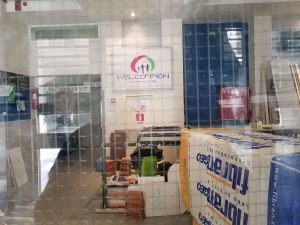
A photo Lizzy took at Welcommon, currently going through renovations.
I want to say it was helpful for people. It was definitely helpful for me personally. It teaches you patience, you learn how to adapt, ‘how do I connect to those people very quickly, what is the best way to impart my message and how to get them to understand. So that is important skills to learn, how to really work on communication.
We asked the two girls about their relationship with their students.
Kelsey: I am an open-minded person and try to really see people for the individuals that they are. That’s what I tried to do with my students, not think of them as ‘oh I’m teaching refugees’ I’m just teaching people who don’t know English. But it was really interesting to hear people’s backgrounds, a lot of them would tell me parts of their story, it was a reminder that this is a bubble I’m creating that’s not representative of what their real lives are.
Lizzy: The other day one of my students told me a little about her story. She said she was living in Lebanon before coming to Greece, and that she was working in a hotel making about $5 per day. She said she came over to Greece on a boat and seemed very thankful that she’d made it here. She only makes €3 an hour here and she told me she only sleeps two hours a night because she works so much and has to care for her son. She doesn’t plan on staying here; she said she wants to move to Spain, where her foster sister lives. Essentially, talking to my students has just opened my eyes to how much refugees struggle, even once they have made it here.
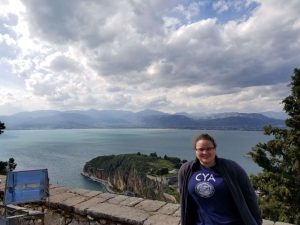
Lizzy on a CYA trip to the Peloponnese
Has volunteering at Welcommon affected your thinking about global politics and the refugee crisis?
Lizzy: This whole experience has made the refugee crisis much more real and apparent to me. I haven’t asked my students a lot of questions about their refugee status but I was interested to learn that none of my students were from Syria. They are from Iraq, Turkey, and Eritrea.
Kelsey: I can’t say I understand the situation better, but I have a better understanding of how difficult it must be having to be at different environment and having to learn so many things at the same time. I remember for example one Iranian man, back home he was a Doctor AND a lawyer, and now he’s here at this very difficult part of his life…
Is volunteering with refugees something you would recommend to someone preparing to studying abroad in Greece?
Kelsey: Yes. When you do these programs (studying abroad) when you go back home, you can’t say all you did was have fun. It’s great to have fun but there are other realities than just seeing the acropolis or walking through the pretty streets of Plaka. So I would recommend seeing different aspects of the actual parts that are affecting Greece. But I would also want them to know, don’t go in with an idealistic view of what it is to teach English to refugees.
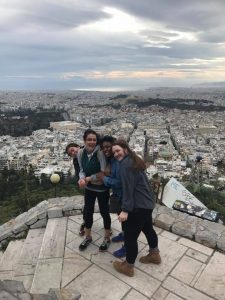
Kelsey and her friends from CYA on Lycabettus Hill, Athens
Thank you Kelsey and Lizzy, for sharing your thoughts with us!
Lizzy Giovanniello and kelsey Serraneau lived and studied in Greece during Spring Semester 2018.




